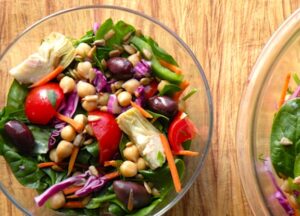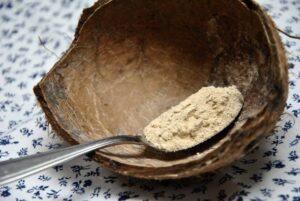Going vegetarian in college did not exactly bring me the surge in health and vitality that I’d expected. Far from it: my sinuses clogged, thoughts grew fuzzy, skin broke out, and periodically I developed the worst stomach pain ever! After some investigation, I suspected that I had a soy allergy, and if you've made your way to this article, chances are you might suspect the same.
After a few weeks of “trying veg,” I would crawl back to my meat-eating ways, ashamed that my body seemed to thrive on chickens, cows and fish. Because I can telepathically communicate with animals, though, the Standard American Diet seemed equally intolerable: I could actually feel the pain, fear and sorrow of each animal I consumed. With the choice to “meet my meat,” or suffer the after-effects of another vegetarian stint, I lost all pleasure in food.
Through sheer determination to make a vegetarian diet work for me, I finally isolated the problem: food allergies. By the time I decided to go vegan, I was allergic to soy, nuts, wheat, and some legumes. In fact, a visit to the allergist confirmed that the only foods I was not allergic to were mold and pork. Ewww! OK, most of those I could do without, but soy? How can someone stay vegan without tofu? Especially if they can’t fill up on seitan and walnuts!
But a funny thing happened. When I eradicated all hidden sources of dairy for thirty days, many of my reactions lessened. Unfortunately, soy continued to annoy for quite some time, and so I learned to live without it.
How can I tell if I’m allergic to soy?
You can visit an allergist to have a skin or blood test, which will determine a true allergy; however, you can experience sensitivities without having a full-blown soy allergy. Symptoms can include stomach pain, breast tenderness, altered menstrual cycle, acne, slow thyroid, mood changes, excess phlegm, brain fog, and/or joint pain.
If you suspect soy plays a role in your health concerns, completely avoid it for two weeks and then reintroduce it. Pay attention to any reactions. If you have a reaction but really, really hope it’s just a coincidence, repeat the experiment again—two weeks off, reintroduce, observe. You might also test different types of soy. For example, some people have trouble with isolated soy protein or chocolate soymilk, but they can eat organic tofu just fine.
People do occasionally outgrow soy allergies, but it can take a year or more of complete avoidance to stop triggering a negative response. Once you determine you have a problem with soy, your quickest route to embracing tempeh probably involves a year of soy-abstinence. Then you can try your experiment again, taking some food enzymes to encourage a happier outcome.
Where will I get my protein?
So many other forms of protein exist that you really don’t need soy in order to thrive. If you tolerate gluten, you can enjoy seitan in place of tempeh or tofu. Packed with protein, this “wheat meat” absorbs flavors just like its soy cousins. Legumes and nuts contain large amounts of protein, too. Soaking beans, nuts, seeds and grains activates their enzymes, thereby increasing the protein your body can absorb from them.
If you still feel concerned about getting adequate protein, Rainbow Light and Nutribiotic make rice protein powders, and a variety of sources sell hemp protein powder, which does not cause the bloating associated with whey or soy supplements.
Also consider some of the largest and strongest animals on earth—gorillas, elephants, bison—who eat mostly greens. Choosing amino-acid rich grasses and leaves, they grow huge muscles without soy sausages and protein supplements. You can, too. To get more greens into your diet, start your day with a “green smoothie,” made popular in Green for Life by raw food educator Victoria Boutenko. Blend a handful or two of greens with two cups of water and some fruit. You might even throw in some superfoods like spirulina, acai berries or hemp nuts. Green smoothies improve your digestion, sometimes eliminating the strain that caused your original sensitivity.
Where can I find a soy-free veggie burger and soy-free, dairy-free milk?
There are lots of soy-free burgers on the market today! Just read labels. You can also make your own by mixing a grain, some beans or seeds, something gooey like nut butter or oil, fresh herbs, and other seasonings—mashing them all together into a patty.
Same goes for dairy-free milks. There are so many kinds on the market — rice, almond, cashew hemp ...
You can make your own alternative milks. To make almond milk, soak 1 cup raw almonds overnight in the refrigerator. Rinse and add three cups of water. Blend thoroughly and then strain through cheesecloth or a special nut/seed milk bag. Save the pulp for something else and then re-blend the liquid, adding in any flavoring you desire.
Why should I cleanse if I have food allergies?
Allergies of any kind indicate that your body has passed its threshold for effective elimination of toxins. When our liver, colon, lungs and kidneys work well, our skin and immune system don’t need to overreact. Ongoing stress, physical or emotional trauma, exposure to pesticides or pollution, medication, and diets rich in animal fat increase our toxic load. Eventually, our organs can’t keep up with the demand for detoxification, and things go haywire. Some people develop cancer; others get asthma. Sometimes the body instinctively rejects otherwise healthy foods that require extra processing.
A healthy body digests soy or wheat, but in a compromised state, even health foods can trigger an aggressive immune response. Burdock root and milk thistle provide liver support, while red clover helps the kidneys. Nettles support kidneys and open the bronchia. Green smoothies, psyllium husks and raw foods stimulate and cleanse the colon. You can also try fasting one day per week, in order to give your digestive system a much needed break.
A word about candida
Most people with food allergies, including soy allergy, also suffer from Candida overgrowth. Commonly known as “yeast,” Candida naturally lives in our digestive tracts. A “yeast infection” or “thrush” indicates severe overgrowth spreading into other areas of the body.
When the ratio of Candida to “good bacteria” grows too high, this fungus latches onto and tears portions of the intestine, creating a “leaky gut” that allows whole protein molecules to enter the bloodstream. These undigested protein molecules seem like foreign invaders to the immune system, which launches an attack.
Oil of Oregano, Pau d’Arco tea, and acidophilus are three common supplements that combat Candida. (Note: in order to reap the highest benefits, take probiotics like acidophilus a couple hours after Oil of Oregano, and don’t try to kill the yeast too fast! Candida produces a severe die-off reaction, so cleansing requires patience.)
Laura Bruno is a Life Coach, Medical Intuitive and Animal Communicator who writes and teaches about natural healing. For more information and articles, please view International Renaissance Coaching.
- For more tips on plant-based nutrition, make sure to browse VegKitchen’s Nutrition page.
- For lots more features on healthy lifestyle, please explore VegKitchen’s Healthy Vegan Kitchen page.








Adam says
I would like to point out that allergies are not caused by failure to eliminate toxins. My legume allergy is triggered by even trace amounts, which is related to the incredible tight binding of IgE to mast cells, which trigger a rapid inflammatory response. Even after a "cleanse" these mast cells will still be present, as they do not rely on any level of "toxin."
Susan says
My allergy to soy shows itself with hives. I get instant itching and whelts sprout up over my body.
Thank you for your article and I found the info to be helpful.
Samantha says
Why suggest beans for those allergic to soy? Most people who can't tolerate soy can't tolerate beans (garbanzo, kidney etc.) either.
Nava says
Samantha, it seems true that many, but not all, of those allergic to soy are are also allergic to beans. This is certainly a matter that every individual who is sensitive to soy should discuss with their allergist. Thanks for the input.
lilouisianagal says
"Because I can telepathically communicate with animals, though, the Standard American Diet seemed equally intolerable: I could actually feel the pain, fear and sorrow of each animal I consumed."
Really now. I'm glad that you have a strong imagination and empathy for animals, but reaLLY? If you can telepathically communicate with them and they're dead (that's generally how Americans eat them), then it would seem like the suffering is over and the line is cut. What if you eat something that has meat or animal product in it but you weren't told? Do you still feel their pain? What about the vegetables--can you communicate telepathically with them? Do they like being eaten? Just saying...
Mary hill says
I have been drinking soy milk for about a year now, then from out of no where I developers stomach issues and joint pain. I went off the soy milk for about a week and started feeling better. Went back on soy milk and have all the issues again!!
Nava says
Mary, obviously the soy milk disagrees with you. Best to listen to your body and stay off of it!
anna says
I have what seems like a soy intolerance. I am allergic to nuts. The soy/nut allergy combo is actually quite common. I cannot tolerate sea-based products such as algae. I can eat cheese, but milk triggers an allergic reaction, and eggs are only ok in small quantities, baked in, as in a cake.
I have been a vegetarian for 10 years, and nearly vegan at times. I drink rice milk and eat cheeses, and eat mostly pasta and veggies. I recently have begun using nutritional yeast. I take multivitamins, calcium, and occasional b12 daily, often suffer from constipation, and am overweight.
I've begun to worry about the health/nutrition aspect of this diet, in regard to energy, weight gain, and general health. Any pointers would be welcome.
Nava says
Anna, it sounds like your various food allergies are really impacting your quality of life. Since I'm a cook, and not a trained nutritionist or dietician. If you are leaning towards being vegan, you might want to contact someone who is trained in this area. One person who comes to mind is Julieanna Hever, MS, RD., the author of books on plant-based nutrition. She seems really great, and has contributed to VegKitchen. Here's her site: http://toyourhealthnutrition.com/ -- perhaps you can have a serious consultation with her.
Some things I see lacking in the diet you describe are beans and legumes, whole grains (esp. quinoa) and dark leafy greens. But please! Do consult a qualified professional who can address what are serious concerns. Please write back and let us know how you are doing!
Janine says
Food allergies to corn, canola and SOY, is not surprising, considering all of these are GMO (genetically modified foods). If you look at Any nutrition label containing the words; soy, high frutose corn syrup, corn starch, etc... you cannot be surprised that many people are having problems. Or it could be the various 20 different pesticides on the non-organic apple you ate with a cup of soy milk at breakfast.
Possum Combes says
Anna - nice to hear about someone else like me 😉 I have a severe reaction to soy & bathroom products with soy in them, not just an intolerance... Good to finally learn that the soy/nut allergy combo is actually quite common, as I am also allergic to nuts as well as legumes and sulphur vegs, nightshades & most fruit. I also cannot tolerate sea-based products such as algae or cucumbers. I can eat cheese, (but it constipates me so I don't) & milk triggers an allergic reaction in me too...(I can use a small amount of cream if needed) Eggs are ok in small quantities, if baked in a cake too... But chickens are fed soy so I avoid eggs most of the time... Btw did you know scrambling eggs is the safest/least likely way to trigger a reaction?! I am just able to eat meats (have trouble with turkey if the bird is fed soy, which happens a lot)
Mertcan says
Most definitely. Both itailanhon or ingestion of the offending agent can cause acute allergic reactions. Allergic reactions are subjective, some people develop tearing of the eyes and congestion. In the worst cases, people might suffer anaphylactic shock the neck swells and closes off the throat making it impossible to breathe.
Dr Jake says
As has been mentioned before, allergies are not the result of the body's failure to eliminate toxins or impurities - it's an immune response that generally develops in utero or in the first few years of life(when the immune system develops fully). As "Adam" said, when an allergen presents itself, IgE binds to mast cells, releasing massive amounts of histamine which is what causes the itchiness, hives, redness, and in some cases, vasodilation and heart depression. If you're allergic to something, you need to avoid contact with that allergen entirely - continual exposure can eventually lead to a worsening of allergic response (think anaphylaxis).
Additionally, the concept of allergies coming from GMO foods is simply untrue. People have been genetically modifying food for approximately 8-10 thousand years (since the advent of agriculture). The simplest and oldest form of genetic modification is breeding. Domesticating plants, by definition, is genetic modification. Only in the past 20 years or so have scientists been actually changing the genetic makeup of cells by inserting or deleting genes to grow GM seeds. And there's no evidence to suggest that test tube GM foods are any less healthy than the rest of foods we call "natural" (quite the contrary, in fact).
Allergies appear to be increasing in prevalence due to the cleanliness of our developmental environments (called the "hygiene hypothesis"). A lack of exposure to fungi, parasites, and microbes at an early age does not stimulate what's called the "Th1 pathway" in immune response. As a result, we develop a propensity to "Th2 pathway" diseases, what we call allergies and autoimmune diseases. This is why people who grow up in developing countries, on farms, or with lots of pets tend to have a lower rate of developing allergies/asthma - they're exposed to far more pathogens as infants.
Mike says
I think we need to differentiate between food INTOLERANCES and ALLERGIES.
While ALLERGIES result from what Dr. Jake describes, I think INTOLERANCES can be caused by factors such as emotions, exposure to toxins, ETC.
My wheat intolerance began about four years ago when I went through a period of stress/depression. I develop severe constipation and brain fog when I eat significant amounts of wheat, but nothing like hives. Maybe it was incidental, but wonder the timing of the intolerance was closely connected to the stress increase.
Jessica says
I beleive allergies/intolerances are mostly due to an unhealthy body. I was born with a diary and possibly gluten allergy. as i grew up drinking on and off dairy and regularly consuming gluten i developed more allergies environmentaly and food allergies. Then I drank alot of alcohol and was exposed to molds/toxins and got alot more developed allergies to everything..my list... dairy, soy, wheat/gluten, shellfish, some nuts, apples, bananas, eggs, ANYTHING with perfumes/parabens. i get lots of gas when eating animal products-assuming like others probably because they were fed corn/soy. i was raised with dogs and birds when i was a kid and my mom never used hand sanitizers on us and she certainly didnt scrub our floors every week. so i dont think it has to do with the environment being too clean. I believe STRICT follow through with cleansing the body would help anyone lessen some of the food intolerances and benefit from it.
Adrianah says
I had several allergies and it just became so impossible to deal with, one of which was soy, that I didn't know what to do. A friend suggested The Allergy Kit. So I went on line and read all of their information and also called them to answer my questions. They were so considerate and informative that I bought the kit. Am I glad I did!!! The Allergy Kit has given me a new life of freedom I couldn't have gotten any other way. It only took two weeks for me. And it is the least expensive treatment I have ever seen for allergies. You do it at home without having to go to the doctor over and over again. Check it out and see if you get the same results as I did. Good luck. Allergies are the most problematic situation I know of.
Sue says
I think my board-certified allergist would prefer that I avoid eating food to which I am allergic -- even after preparing by relaxation and gratitude, etc. A better preparation would be to have an Epi-Pen and Benadryl on hand and have emergency services on speed dial. This is unsafe advice. Allergies can be life threatening and aren't spiritual defects.
Have you tried Sea Algae? says
Try Spirulina and Chlorella. They're one of the world's most concentrated sources of protein (around 60% by weight) and they contain a host of minerals, especially iron. The taste can be masked by baking it into dough with other ingredients (for example, any given grain or nut or even coconut flour with spirulina and chlorella). You can also consume it as a shake if you will.
Nava says
Thanks for these great suggestions, jkjk!
Stacy says
This is rude and offensive advice. Allergies are nothing to do with a person's health or holistic connection to what they consume. They are genetic. I have an avocado allergy, my body does not (and will not ever) recognize the proteins in avocado and if I accidentally eat it or use a beauty product containing avocado oil in it's ingredients, my body goes into attack mode and fights the proteins as if they were a dangerous virus. This is no different to soy allergies. Additionally, allergies worsen over time and reactions tend to be bad the first time then worse the second and so forth, so if a person has reacted badly once it is dangerous for them to attempt to try to eat that food again. Leaving this advice for anyone out there with these allergies.
irene says
I have a lactose intolerance, but drink a small amount of lactose free milk every day. I eat no other dairy products. I am sensitive to peanuts and soy and other legumes and it seems to get worse on the rare occasions when I do consume them. I was very regularly exposed to these foods when I was a child and had asthmatic bronchitis and eczema. I am almost sixty now and my problems started twenty years ago. I have the same sort of symptoms now plus a very hoarse voice and extreme heart palpatations. Not to speak of what happens to my gastric system. To get my proteins, I eat a small amount of meat every day. I am on a very low budget and can't buy all those super foods you speak of. I do pity the animals.
anupama swamy says
I have an autoimmune disorder and i have become a began for past 6 months.l had noticed Thai i get joint pains with soy so i avoided it. But in a restaurant i ate tofu in salad and pizza for two days and also had tofu in salad thinking that it is healthy. After two days i started getting joint pains .i have stopped tofu last three days but the pains are still there.how long will it take to feel better and what else can i do to feel better?place help
anupama swamy says
I suffer from an autoimmune illness . I think i have developed intolerance to tofu in the form of joint pains.How many days does it usually take to clear ?what else can I do to help myself ,for example any changes in the diet ? I am a vegan .
Nava says
Your question is a good one, but it deals with a medical issue, which we're not qualified to answer. It sounds like consulting with a vegan-friendly Registered Dietician would be beneficial. If you don't have one in your area, you can consult Virginia Messina or Julieanna Hever (doing a google search will lead you to their sites). Good luck!
sarah says
I'm allergic to hazelnuts. I tend to avoid all nuts since they sometimes imitate the same mouth tingling discomfort that I get from eating hazelnuts. I am not allergic to milk ( I think) but when I drink soy milk sometimes my mouth tingles / hurts a little and I have felt bumps come under my chin minutes after I drank soy milk. A few years ago I developed eczema on my arms that is not flaky, inflamed, or itchy , but stays on as discoloration. Random bumps keep starting on my arms and legs. I was a middle distance runner in my school's track and cross country teams , so I don't think the bumps arose from poor health or diet or hygiene (often took showers after races and practice). What allergies might I be facing (possibly in addition to soy)?
Nava says
Hi Sarah, this is the kind of semi-medical question we're not qualified to answer. It sounds like you might need to visit an allergist as well as a Registered Dietician. We wish you the best of luck with your health!
Cathy says
For those who posted about how long it takes for a food allergy related symptoms to abate... it varies, however about 4 to 5 days is typical and it should be gone by 7 to 10 days. If not you've either been exposed again, or there is a different problem. Sometimes laxatives (gentle ones) can speed clearing some of the proteins out of your body, lots of fresh water/fluids, normal diet and gentle exercise may also help. If symptoms involve a rash or difficulty breathing get medical help immediately.
Catherine Munson says
More recently, it has been suggested and researched that over exposure to antibiotics may be the reason for an increase in allergic and auto-immune disorders such as asthma. This makes more sense to me than the hygiene hypothesis, since many who suffer the most from asthma live in inner city environments where cleanliness and a cockroach free home are basically impossible.
This also would explain why people who lowered their meat consumption or switched to organic meat might have lowered sensitivities to foods, etc. over time. For those with soy sensitivity, there are some places that sell pasture fed poultry and eggs. I think it's funny that eggs are advertised as "vegetarian diet" when it is natural for most birds to eat some insects, worms, etc. in addition to plant foods.
Katherine says
I agree that GMO's do not cause allergies. However, they do pose many other health hazards. I'd like to point out that my family has farmed in the U.S for five generations and I know a thing or two about healthy food and the current quality of what is being produced in our country. "Dr." Jake is woefully uninformed. He needs to do some serious research on GMO's. There is a world of difference between selecting for desirable traits--as any farmer does--and inserting genes into a plant that allows it to survive toxins that kill off every other plant in sight. If Dr. Jake deals with human patients, perhaps he should spend some time talking with veternarians--they actually see the damage livestock can suffer when fed a GMO based diet.
Laila says
I am allergic to GMO soy: if I eat it I have severe asthma. Eating organic soy is fine to me. It happened the same with wheat. I have to make bread using 100% organic wheat and my sour dough because inside organic breads the yeast is not fien for me. If I try a bite of GMO bread (GMO flours, GMO yeasts) I seek the emergency room. I changed my diet to organic and I can enjoy all food I want.
Emma says
I have had dietary problems for years and they seem to get worse the older I can. I had a pin prick blood test from a naturopath which showed that I am intolerant to: Wheat, yeast, eggs, dairy, legumes and cashew nuts. Dairy does not upset my gut, rather about a week later my skin starts to break out. Whereas everything else causes me digestive problems. I changed to soy milk years ago due to my dairy allergies, however it appears perhaps this is one major factor. Could soy be the cause of so many other of my intolerances. I have one or 2 soy lattes per day, sometimes none, and other than that don't really consume much of it. It doesn't give me any noticeable reactions straight away so I've never made the decision to fully cut it. Surely there's a reason why people are developing more and more intolerances. What is the best way to cleanse your system completely?
Vegan Store says
Soy is a highly nutritious food, which benefits cannot be neglected; it is rich in protein, vitamins, and also minerals. If you will love some energetic stuffs too, you can give soy a trial, it is really an all rounder. I had once enjoyed a meal once mixed with soy and other nourishing foods.
Nava says
This is true, Vegalyfe, but it also can't be ignored that many people do have true soy allergies and intolerance. Everyone needs to listen to their own body's needs!
hdibgfi says
Yes, but where can I find seitan for a good price that ISN'T covered with SOY SAUCE!!?
hdibgfi says
Also, Quorn is delicious! 😀
Nava says
You can easily make your own seitan: http://www.vegkitchen.com/recipes/homemade-seitan/ — simply leave out the soy sauce and use salt instead. You can also use a low-sodium broth to cook it in for more flavor, rather than water with bouillon cubes. It's not easy to find commercially prepared seitan that isn't made with soy sauce!
Sum says
I would like to be vegan, but every option you listed, I am allergic to. I'm allergic to all nuts, all beans, and soy. Someone told me I should just eat vegetables for protein... But that requires a lot of veggie tables for the amount of exercise I do. And I don't wanna live off carbohydrate filled things either
Nava says
Wow, that really is limiting. How about seeds? Hemp seeds are a really good source of full protein. And quinoa (as well as other grains) is high in good quality protein as well. I wonder if you're allergic to other legumes aside from beans, like lentils and peas. Some veggies that are relatively high in protein (high for vegetables, that is) include broccoli, sweet corn, and spinach. I hope that helps!
dph says
So much talk of allergies, and yet no mention of NAET? Do your research and find a qualified NAET practitioner & he/she can literally re-train your body to accept foods that once caused a reaction. I'm going thru this now & it's pretty amazing - tho not cheap. There is also something called "The Allergy Kit" which allows you to treat yourself. I haven't used this, but it seems to get excellent results. I wish I had known about these thing years ago.
Tara says
I have always been healthy and really fit with a six pack! About 8 years ago my digestive system completely stopped working. I was going through a lot of stress and on antibiotics all the time due to strep throat. Long story short, I finally got my digestive system back on track. After many surgeries, procedures and etc. Now my HUGE problem is my stomach looks like I'm 7 mths pregnant anytime I eat. I got tested by an allergist and I'm allergic to: soy.milk.eggs.tuna.flounder.crab.strawberries.whole wheat.chicken.mushrooms.lettuce
Like wtf? What am I supposed to eat? Soy.wheat and dairy is in EVERYTHING!?!
If I'm allergic to all of that, do you think it means I'm allergic to all shell fish? HELP! I'm tired of being skinny everywhere and looking really pregnant every time I eat.
I'm hitting a brick wall here. so frustrating and upsetting.
Steve Lo says
I couldn't digest milk as an infant, but turned out I never did very well with milk/gluten/soy either. If I eat grains without soaking it there would be problem to my teeth. In fact I feel better by skipping all grains except white rice (no gluten)
mskmm says
This is a good article and something that needs to be brought up more with vegans. I'm glad I don't have any allergies. I have a teacher who is allergic to soy though and I know alot of people aren't comfortable with seitan because of the anti-gluten craze. As other comments have mentioned some people will be allergic to nuts, seeds and all beans. Someone who is more active or into weight training/body building might need more protein and most people get that protein from soy (and maybe rice/pea/hemp protein powders but people would still need real food).
It seems if someone has these allergies it would take even more prep work to go vegan without that convenience of having tofu or veggie burgers. Even if it is hard to go 100% vegan someone could still give up the dairy, eat less meat and only what is needed to meet nutritional requirement and go the rest plant based.